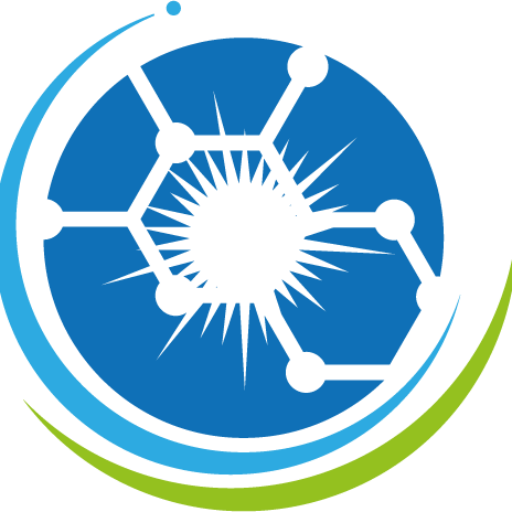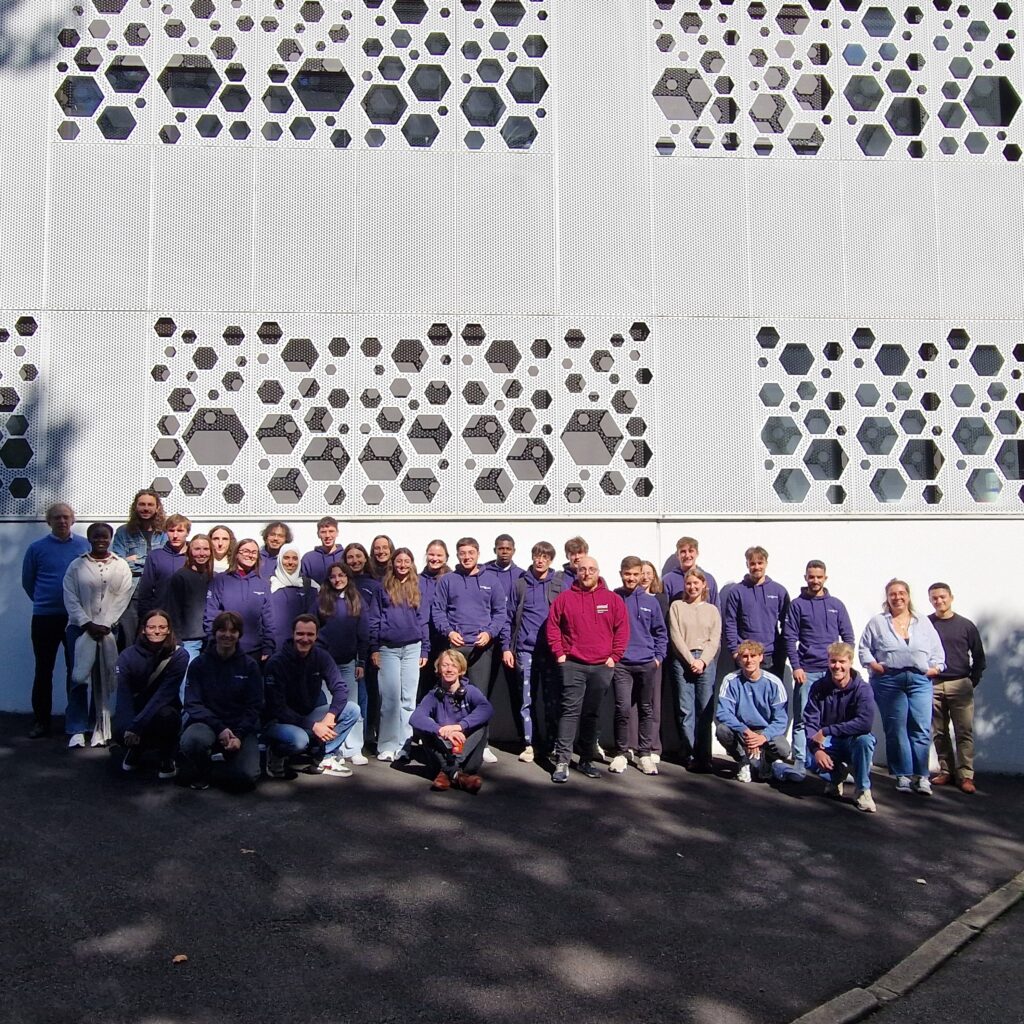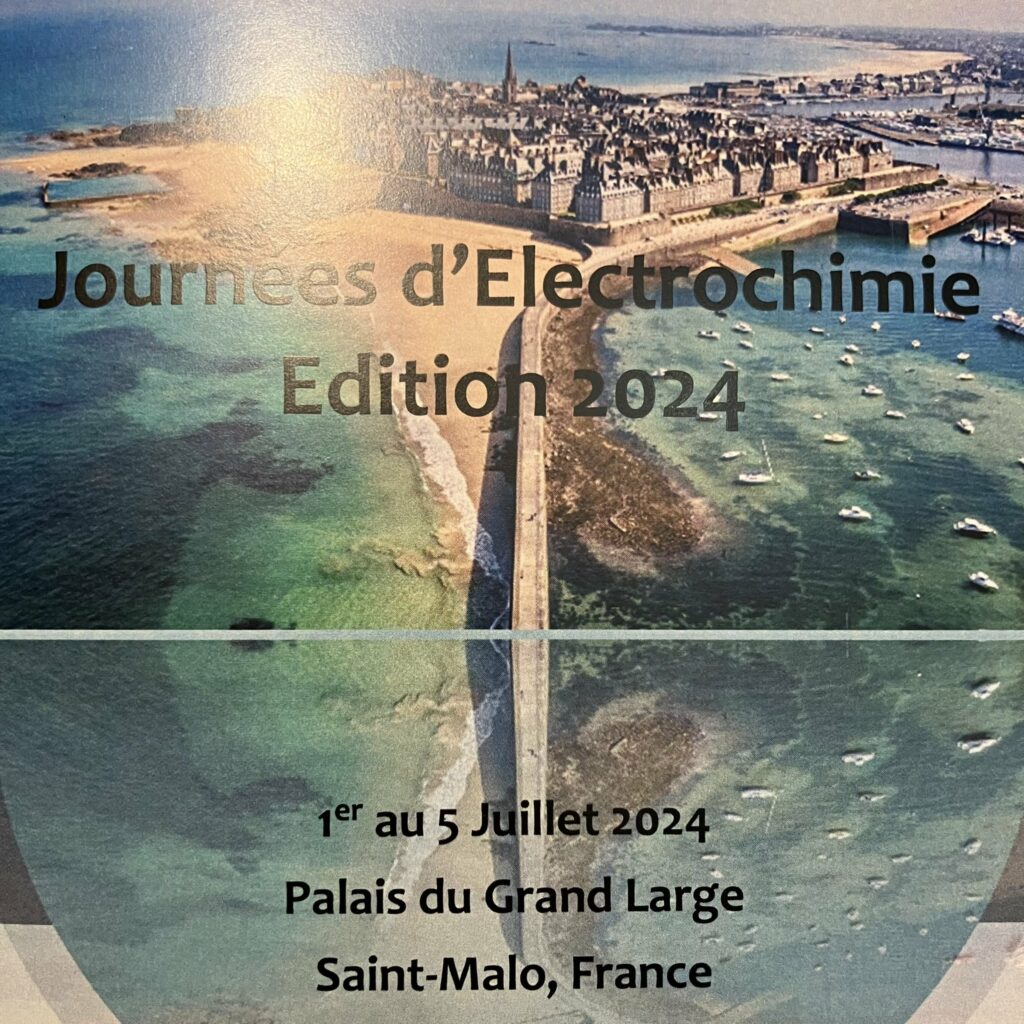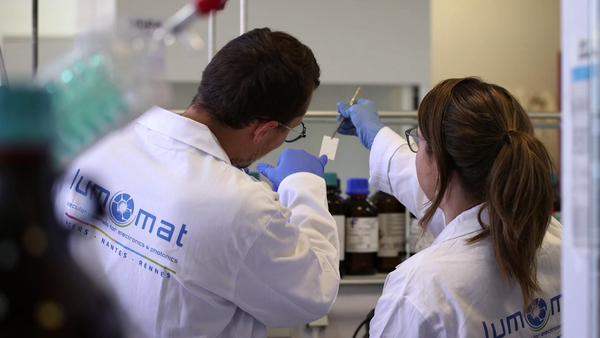Actualités
Journée scientifique 2024 de l’EUR LUMOMAT
Un grand merci aux conférenciers, aux doctorants, aux étudiants et à tous les participants de la journée scientifique EUR LUMOMAT organisée à Nantes Université le 14 novembre dernier.
Encore félicitations aux lauréats de la session poster Alexia Rocheteau (doctorante au laboratoire IMN) et Denis Ari (doctorant au laboratoire ISCR)!
Prochain évènement en cours de construction pour 2025…


Journée scientifique 2024 de l’EUR LUMOMAT Lire la suite »
Journée scientifique LUMOMAT 2024
Le projet EUR LUMOMAT organise le jeudi 14 novembre prochain une journée scientifique sur le campus sciences de Nantes Université. La journée démarrera à 9h et sera rythmée par des conférences scientifiques, des présentations de posters par les doctorants ainsi qu’un cocktail sur le temps du midi.
Nous aurons le plaisir d’accueillir:
Dr. Carlos Brites (University of Aveiro, Portugal): https://hybrids.web.ua.pt/cdsbrites.html
Prof. Valérie Heitz (Université de Strasbourg) : http://lsamm.fr/valerie-heitz/
Prof Luca Dell’Amico (Université de Padoue, Italie): https://dellamicogroup.com/
Prof. Aurélie Perrier (Université Paris Cité): https://www.linkedin.com/in/aur%C3%A9lie-perrier-144867b2/
Journée scientifique LUMOMAT 2024 Lire la suite »
Bourses d’attractivité d’excellents doctorants
Le projet LUMOMAT lance la troisième édition de son financement « Bourses d’attractivité d’excellents doctorants » dans les laboratoires partenaires du projet EUR LUMOMAT.
Tous les doctorants travaillant sur une thématique LUMOMAT et démarrant leur première ou leur troisième année de thèse peuvent déposer un dossier jusqu’au 14 novembre 2024.
Les doctorants ayant déjà bénéficié de la bourse au démarrage de leur thèse peuvent déposer un nouveau dossier dans la catégorie « Bourses d’attractivité d’excellents doctorants démarrant leur troisième année ».
Toutes les informations sont disponibles sur la page: https://lumomat.fr/financements/ dans la catégorie DOCTORANTS – Bourse d’attractivité.
Bourses d’attractivité d’excellents doctorants Lire la suite »
Journée d’intégration Master de chimie LUMOMAT
Vendredi 13 septembre nous avons organisé au laboratoire CEISAM une journée d’intégration pour les étudiants du master de chimie LUMOMAT. Nous avons eu le plaisir d’écouter Yann Pellegrin lors d’une conférence sur la photochimie et d’avoir le témoignage de cinq étudiants diplômés du master qui ont tous un parcours passionnant. Encore un grand Merci à Chloé Dindault, Melanie Dreano, Axel Houssin, Romain Guechaichia et Jason Bessonnet pour leurs témoignages.
Bonne rentrée à tous!
On Friday September 13, we organized an integration day at CEISAM for students in the LUMOMAT chemistry master’s program. We were delighted to hear Yann Pellegrin give a talk on photochemistry, and to hear from five graduates of the master’s program, all of whom have had inspiring careers. Many thanks again to Chloé Dindault (PhD), Melanie Dreano, PhD, Axel Houssin, Romain Guechaichia and Jason Bessonnet for their testimonials.
Happy back-to-school!
Journée d’intégration Master de chimie LUMOMAT Lire la suite »
Journée scientifique LUMOMAT – 14.11.2024
Le projet EUR LUMOMAT organise le jeudi 14 novembre prochain une journée scientifique sur le campus sciences de Nantes Université. La journée démarrera à 9h et sera rythmée par des conférences scientifiques, des présentations de posters par les doctorants ainsi qu’un cocktail sur le temps du midi.
Nous aurons le plaisir d’accueillir:
Dr. Carlos Brites (University of Aveiro, Portugal): https://hybrids.web.ua.pt/cdsbrites.html
Prof. Valérie Heitz (Université de Strasbourg) : http://lsamm.fr/valerie-heitz/
Prof Luca Dell’Amico (Université de Padoue, Italie): https://dellamicogroup.com/
Prof. Aurélie Perrier (Université Paris Cité): https://www.linkedin.com/in/aur%C3%A9lie-perrier-144867b2/
Un programme scientifique complet sera diffusé dès que possible.
Les participations sont à confirmer par retour de mail avant le lundi 30 septembre.
Pour les doctorants intéressés par la présentation d’un poster, nous vous invitons à nous écrire avant le lundi 23 septembre à noemie.barbot@univ-angers.fr
Journée scientifique LUMOMAT – 14.11.2024 Lire la suite »
Journées d’électrochimie 2024
Du 1er au 5 juillet ont lieu à Saint Malo les journées d’électrochimie. Organisées par le laboratoire ISCR et l’Université de Rennes avec la participation des collègues du laboratoire MOLTECH Anjou, ces journées sont soutenues financièrement par l’EUR LUMOMAT.
Si vous souhaitez organiser un congrès avec le soutien financier de l’EUR LUMOMAT, vous pouvez compléter le formulaire dédié disponible sur le site web dans la catégorie Permanents: https://lumomat.fr/financements
Journées d’électrochimie 2024 Lire la suite »
Classement l’Etudiant 2024
l’Etudiant a dévoilé son nouveau classement des meilleures villes étudiantes 2024. Pour cette édition, 47 villes françaises qui accueillent plus de 8.000 étudiants ont été comparées. Les trois sites de formation du master de chimie LUMOMAT sont dans le top 10: Rennes (2), Angers (6) et Nantes (10)! https://lnkd.in/eKGEAqqg
Angers et Rennes sont même les deux villes préférées et recommandées par les étudiants: Budget, logement ou encore ambiance, ces villes dynamiques à taille humaine, à moins de 2h de la mer et de Paris sont idéales pour réussir ses études. https://lnkd.in/exgNQq6t
Plus d’informations sur le master de chimie LUMOMAT sur notre site web: https://lnkd.in/egQKvhTk
Classement l’Etudiant 2024 Lire la suite »

















